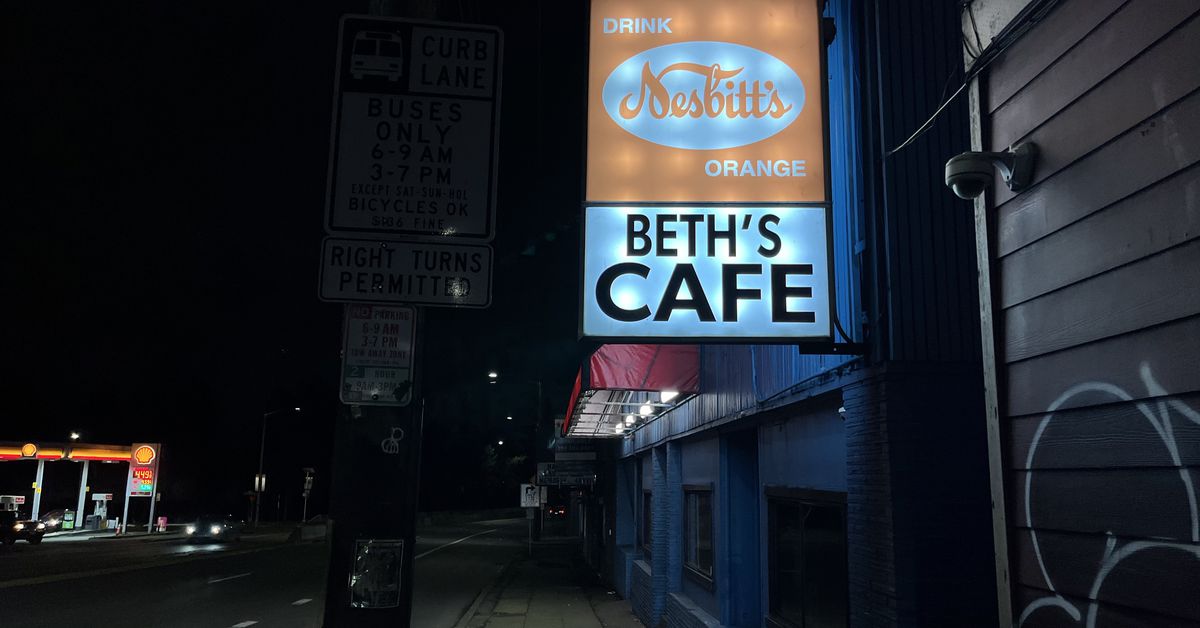Beth’s Cafe, on the side of Aurora as you drive through Green Lake, is a battered, venerable diner that for decades has been the place in north Seattle to go when you need to eat after midnight. It’s small, it’s unpretentious, it’s family-friendly, and it has a problem: eggs.
As nearly everyone knows by now, an outbreak of bird flu has killed so many chickens that the supply chain has been badly disrupted. Prices have gone up, stores are struggling to keep eggs in stock, and restaurants nationwide are scrambling (pun intended) to navigate the new environment. Some places have changed their menus to de-emphasize eggs while others are charging more — Waffle House now has a 50-cent per-egg surcharge.
Among Seattle restaurants, Beth’s is particularly affected by this shortage. It’s famous for its massive, 12-egg omelets, and even its six-egg omelets and three-egg scrambles are heavy on the eggs. The diner goes through 15 to 20 cases of eggs a week, co-owner Mason Reed (who took over Beth’s last year) tells Eater Seattle. A case is 15 dozen eggs, so that means the restaurant cracks open upwards of 3,600 eggs a week, which averages to more than 500 per day.
Since the onset of the bird flu, Reed has been stressed about getting enough eggs to meet that demand. Beth’s had been sourcing its eggs from Wilcox Farms, but “lately we’ve had to branch out,” the owner says. Reed and his team have been going to Costco and US Food’s Chef’Store and making calls to anywhere that might have eggs. The prices can vary wildly, and some distributors have limits on how many eggs they can sell. “It’s been a juggling act,” Reed says.
“I feel like a drug dealer trying to find my source,” Reed adds. “I’m calling around, going, ‘What’s the price? How many can you offer?’”
It’s not just the bird flu causing prices to rise. At the beginning of 2024, a new Washington law required all eggs sold in the state to be cage-free. The price per egg Beth’s was paying jumped from 9 cents to about 27 cents; a case was around $40, Reed says. In the past few months prices have jumped again and now Reed is paying anywhere from $80 to $150 per case, depending on the week. “It just is really turbulent,” says Reed.
Menu prices reflect these changes. In 2020, the Triple Bypass version of the 12-egg omelet (with bacon, sausage, ham, and two kinds of cheese) was $22.50, according to the Seattle Times. In 2023, when Beth’s reopened after a temporary closure, the price had ticked up to $34.95. Now that same omelet is $41.95. Reed says he’s raised prices twice since the start of 2024, once to deal with the cost of the cage-free law and once to offset the cost of Seattle’s rising minimum wage.
“Beth’s is famous for their big omelets, it’s not something I want to get rid of,” Reed says. But he is contemplating menu changes. Reed says the restaurant may try to have more non-egg options, including tofu scrambles, and offer smaller portions for under $15. “We’re trying our best to keep prices as low as possible,” he says. Beth’s may offer $42 omelets for the wannabe competitive eaters out there, but at its core it’s a diner that’s supposed to serve affordable, filling food to families and working people.
At least Reed has found a stable source of eggs, for now. “They’re a lot more than they were, but [the price] is not going up,” he says. His new supplier is a California-based company called Alderwood Eggs, but he hesitates to throw that name around. “I don’t want to put it out there because I don’t want everyone to buy all my eggs.”











